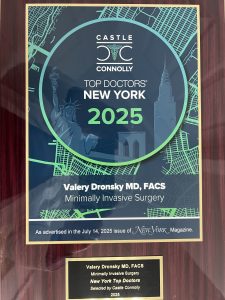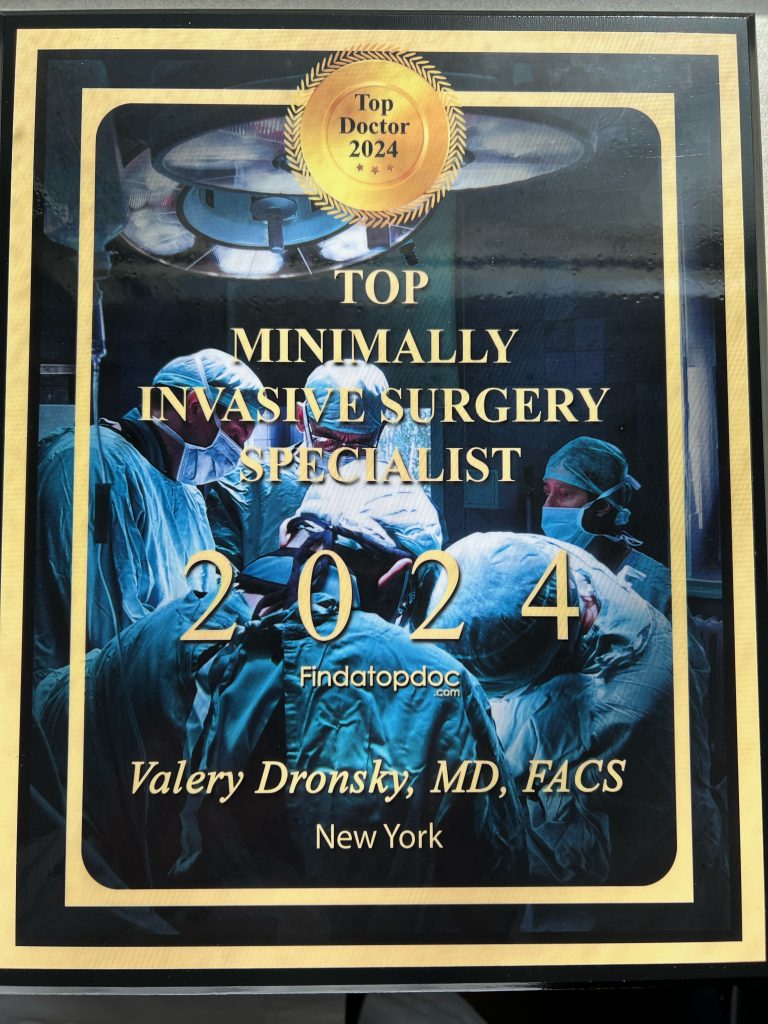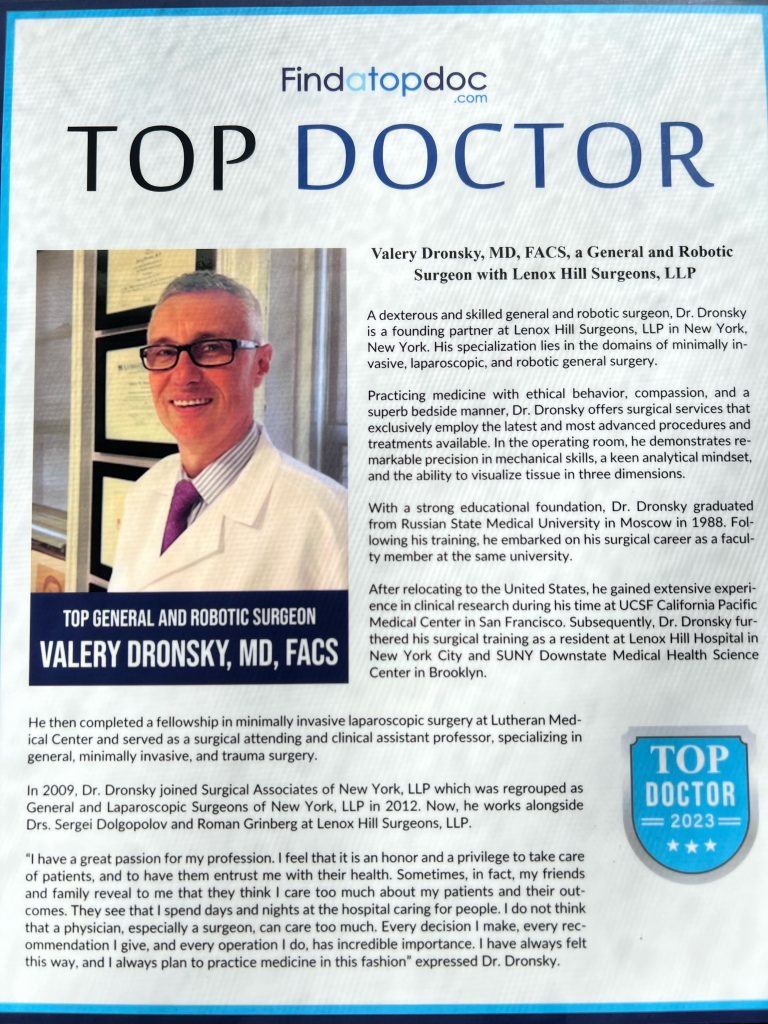CALL TODAY 646-846-1136 | EMAIL
Surgical Experts Dedicated to Improving Lives
At Lenox Hill Minimally Invasive Surgery PLLC, Dr. Valery Dronsky and his staff of medical professionals provide compassionate care with the highest ethical & professional standards. In our state of the art facility, we offer surgical services using only the most cutting edge and current procedures and treatments. We specialize in general surgery, including extensive experience in performing hernia repair surgery. Our expertise is in minimally invasive surgery and robotic surgery. Minimally invasive and robotic surgery often allow patients to experience easier recovery than traditional open surgery. They also allow for more precise and less traumatic surgery. When robotic and minimally invasive surgery is not an option, we are also skilled and experienced in traditional open surgical procedures.
Dr. Dronsky is an experienced and highly skilled surgeon having undergone extensive training in school, residency and fellowships. He practices medicine with ethical behavior, compassion and superb bedside manner. In the operating room he exhibits precision mechanical abilities, analytical thinking and the ability to visualize tissue in three dimensions. These innate and learned skills allow Dr. Dronsky to be one of the most dexterous and skilled professionals in New York City and the Country.
Call us: 646-846-1136
PATIENT TESTIMONIALS
Recent Awards
We are honored and deeply appreciative to have consistently received prestigious awards and recognition year after year, establishing us as one of New York’s foremost hospitals for a wide range of general surgeries, safety measures, specialized procedures, and overall excellence in healthcare. At Lenox Hill Minimally Invasive Surgery, our unwavering commitment lies in delivering exceptional care and unwavering support to our patients, guaranteeing their safety and successful recovery throughout their entire surgical experience.
Hospital Quality Awards
 America’s 50 Best Hospitals Award™ (2023, 2022)
America’s 50 Best Hospitals Award™ (2023, 2022)
Top 1% in the nation for providing the highest clinical quality year over year.

America’s 100 Best Hospitals Award™ (2021)
Top 2% in the nation for consistently delivering clinical quality year over year.

America’s 250 Best Hospitals Award™ (2023, 2022, 2021)
Top 5% in the nation for consistently delivering clinical quality.

Patient Safety Excellence Award™ (2023, 2022)
Top in the nation for providing excellence in patient safety by preventing infections, medical errors, and other preventable complications.
Specialty Clinical Quality Awards

America’s 100 Best Hospitals for Cardiac Care Award™ (2023, 2022, 2021, 2020, 2019)
Superior clinical outcomes in heart bypass surgery, coronary interventional procedures, heart attack treatment, heart failure treatment, and heart valve surgery.

America’s 100 Best Hospitals for Coronary Intervention Award™ (2023, 2022, 2021, 2020, 2019)
Superior clinical outcomes in coronary intervention procedures (angioplasty with stent).

America’s 100 Best Hospitals for Prostate Surgery Award™ (2023, 2022, 2021)
Superior clinical outcomes in prostate removal surgery and transurethral resection of the prostate.
Click to see all of our Healthgrades best doctors awards





Visit our main website at www.LenoxHillMinimallyInvasiveSurgery.com
Blog Posts are Below:
Monthly Archives: July 2020
Colon Surgery for Cancer
Colon cancer is one of the common types of cancer that starts from the large intestine. Colon cancer occurs in the last part of your digestive tract, and it tends to affect adults, but it can also take place at any age.
Most doctors advise some screening tests for people with no symptoms or signs to look for colon cancer or noncancerous colon polyps. At the early stage of colon cancer, your chances of being cured are quite high. Screening can help detect colon cancer at an early stage.
Generally, doctors will recommend people of around age 50 to begin screening because, at this age, they tend to be at risk of developing colon cancer. But people with a family history of colon cancer are at higher risk of having colon cancer, and they should consider getting screened earlier.
There are quite a lot of screening options, and every one of them has its own set of drawbacks and benefits. Before choosing any type of screening, it would be best if you discuss them with your doctor. Doctors are experts that give you advice concerning the most suitable and appropriate options.
Doctors use screening for a colonoscopy; thus, they can remove polyps at the time of screening before it turns into advanced stage cancer.
Causes of Colon Cancer
Colon cancer specialists are not sure about its causes. Usually, colon cancer starts when healthy cells in the colon expand and undergo changes in their DNA. Your DNA holds several sets for instructions.
Healthy cells raise and split in an orderly technique according to your DNA instructions, which maintains normal function of your body. Your cells will become cancerous when the cell’s DNA is damaged, and they continue to divide or multiply.
A tumor will occur in your body as soon as the cells build up. As time passes, the cancer cells can develop to attack and wipe out normal healthy tissue. Cancerous cells can reach other parts of your body and begin multiplying there too (metastasis).
Colon Surgeries for Cancer
There is more than one treatment to cure colon cancer, but the ones that help you depend on your current situation. Also, the type of treatment you select involves the exact spot of your cancer, every type of health concern, and, most importantly, its stage. Usually, the treatment for colon cancer includes surgery to eliminate it. Doctors might recommend some other treatments too, such as chemotherapy and radiation therapy.
Surgeries for Early-Stage Colon Cancer
For small colon cancer, your doctor might recommend you a simple invasive approach through surgery. Following are those simple invasive surgeries;
· Remove Polyps While a Colonoscopy (polypectomy)
As for small and localized cancer, which contain a polyp while being at an early stage, your doctor can eliminate it entirely while performing a colonoscopy.
· Endoscopic Mucosal Resection
The doctor can remove larger polyps during colonoscopy with the help of some special tools and a small quantity of the colon’s inner lining. In scientific terms, you can cell this whole procedure, an endoscopic mucosal resection.
· Minimally invasive surgery (laparoscopic surgery)
There is a type of polyp that doctors can’t remove during a colonoscopy, but they can eliminate it with laparoscopic surgery. In this procedure, the surgeon will operate quite a lot of small incisions on the wall of your abdomen. The surgeon inserts these instruments and attaches a camera with them, which will display your colon on a video. They might also take samples from lymph nodes where the cancer is situated.
Symptoms of Colon Cancer
Below are the common signs and symptoms of colon cancer. Even early-stage patients of colon cancer have these symptoms:
- A constant change in your bowel condition, including constipation, diarrhea, or a difference in your stool’s stability.
- Blood or rectal bleeding in your stool.
- Continuous abdominal discomfort like gas, cramps, or pain
- A feeling that your bowel doesn’t clear entirely
- Fatigue or weakness
- Unplanned weight loss
Moreover, many colon cancer patients do not experience any of the above symptoms, especially in the early stages. Symptoms that do appear are likely to vary slightly, although it depends on the size and location of your large intestine’s cancer.
Conclusion
Several medications can reduce the risk of colon cancer or precancerous polyps. However, you must not take these medications before consulting with your doctor. You can also contact Lenox Hill Minimally Invasive Surgery by visiting their website. You can search for your disease or condition and its pertinent treatment through their website. There is plenty of important information about colon cancer and surgical treatment.















